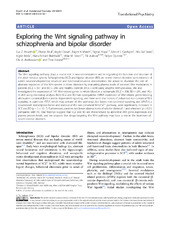Exploring the Wnt signaling pathway in schizophrenia and bipolar disorder
Hoseth, Eva Zsuzsanna; Krull, Florian; Dieset, Ingrid; Mørch, Ragni Helene; Hope, Sigrun; Gardsjord, Erlend Strand; Steen, Nils Eiel; Melle, Ingrid; Brattbakk, Hans-Richard; Steen, Vidar Martin; Aukrust, Pål; Djurovic, Srdjan; Andreassen, Ole Andreas; Ueland, Thor
Peer reviewed, Journal article
Published version

View/
Date
2018Metadata
Show full item recordCollections
Original version
https://doi.org/10.1038/s41398-018-0102-1Abstract
The Wnt signaling pathway plays a crucial role in neurodevelopment and in regulating the function and structure of the adult nervous system. Schizophrenia (SCZ) and bipolar disorder (BD) are severe mental disorders with evidence of subtle neurodevelopmental, structural and functional neuronal abnormalities. We aimed to elucidate the role of aberrant regulation of the Wnt system in these disorders by evaluating plasma levels of secreted Wnt modulators in patients (SCZ = 551 and BD = 246) and healthy controls (HCs = 639) using enzyme immune-assay. We also investigated the expression of 141 Wnt-related genes in whole blood in a subsample (SCZ = 338, BD = 241, and HCs = 263) using microarray analysis. Both SCZ and BD had dysregulated mRNA expression of Wnt-related genes favoring attenuated canonical (beta-catenin-dependent) signaling, and there were also indices of enhanced non-canonical Wnt signaling. In particular, FZD7, which may activate all Wnt pathways, but favors non-canonical signaling, and NFATc3, a downstream transcription factor and readout of the non-canonical Wnt/Ca2+ pathway, were significantly increased in SCZ and BD (p < 3 × 10−4). Furthermore, patients had lower plasma levels of soluble dickkopf 1 and sclerostin (p < 0.01) compared with HC. Our findings suggest that SCZ and BD are characterized by abnormal Wnt gene expression and plasma protein levels, and we propose that drugs targeting the Wnt pathway may have a role in the treatment of severe mental disorders.
